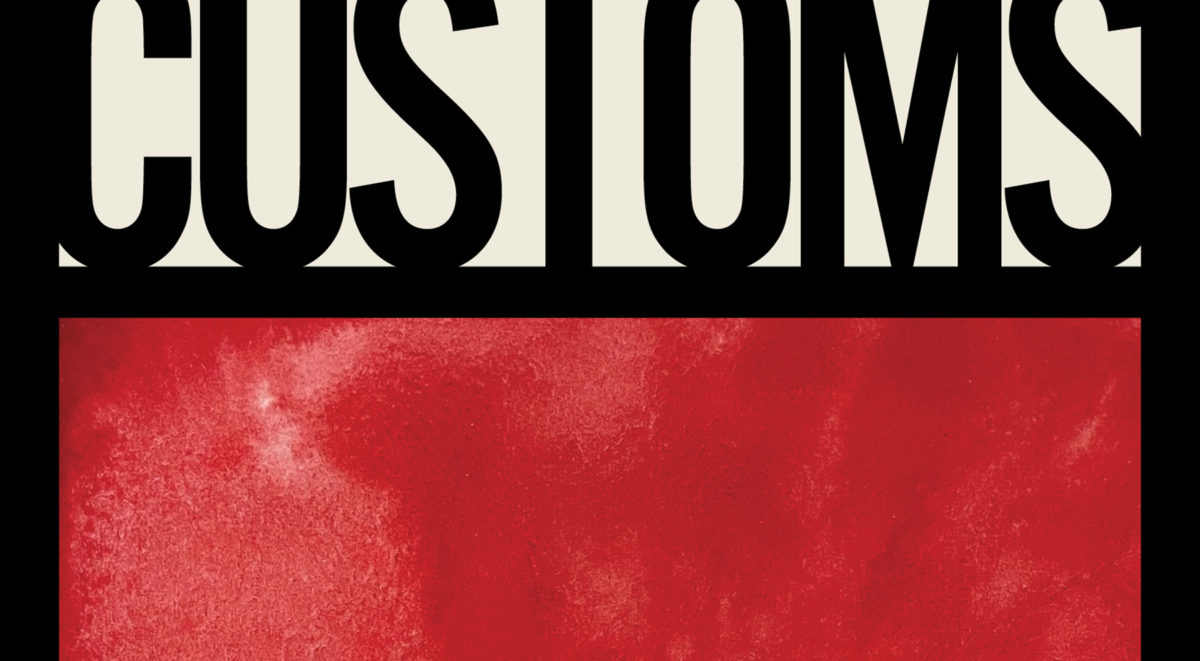
Customs
Solmaz Sharif
Graywolf Press, 2022
Review by ALHS
Solmaz Sharif’s Customs opens with an eruption in the face of the violence of conditionality: “I had to.” This first poem is titled “America.” Customs is poetry about conditionality in that it makes its unlikely way about that vast space conditionality has occupied, once-cautious and with its back to the walls, but bursting through the crevices nevertheless. Sharif’s highly anticipated second collection is a red book, and its redness, unmistakable in the post, does not come from nowhere. Sharif’s keen vision in these poems, fatigued and reddened, waits for her to exit customs, and writes of her arrival, “watched, from shadow to shape to gait, my / imagined life come to life.” This poem is called “Visa.”
Customs stirs a froth of questions: does “visa” have etymological roots in vision reddened? Should I call my grandmother and tell her she is beautiful? For each officer at a terminal, is there a poet whose mother is removing Gorky’s Mother from the library because the Shah is coming to tour the school? Sharif does not ask these questions so much as catch them in their turn, before they rot into the imperative into the conditional. Conditionality writhes in the strophes of “Self-Care,” in the concern of the past-participle yes-or-no questions eager to fault you if you get too many nos in a row:
Have you tried
rose hydrosol? Smoky quartz
in a steel bottle
of glacial water?
This is the America of checkpoints that Sharif can recognise anywhere, this star-spangled fabric of its language. This poem stacks questions atop questions. They are imperative, an imperial utterance made beautiful with flourishes, perhaps even by the dappled punctuation that remains in vision just long enough to bring politeness ashore.
Sharif builds, perhaps builds towards, a different kind of utterance. So often in these poems does the utterance belong to the speakers of last words, the ones naming the others, the counterfactual and the borrowing—that these utterances lend themselves to italicised type, that familiar marker of otherness from the yesterpoems, rather than containment within quotation marks. This different utterance enters with finality. If eruption is to be thought periodic, it is relentless and often enough to be in eternal movement. In “Persistence of Vision: Gwendolyn Brooks,” Sharif borrows eruption into eruption, writes: “They make excellent corpses among the expensive / flowers…I imagine hills and hills dappled like this.”
Sharif writes outstaring the surveillance state, outmeaning its language. Language has lapsed too often into hostile terrain, into the interrogative. There is a poem in this collection, a chill from its title to its final question(-mark), where language has lapsed into a shard upon which one whets what they may or may not say in front of power. This poem is unmistakable, its aftertaste a speechlessness that passes from stun to deliberate pause.
“To find a spot on any wall to stare into,” Sharif catalogues in the “The Master’s House,” and this cataloguing is intransitive in several directions. It carries an inevitable incompletion of the master’s house, and its containment nevertheless. Sharif’s eruption is not an eruption of or an eruption from. The language in Customs and its relational past, like history that never leaves its events behind, is an eruption through. The staring is not at but into. An eruption on the other side of the page could cry, what a poet must carry, but that suspended exclamation too would turn to Sharif’s words: “To have a tense of is-was, the residue of it over the clear bulb of your eyes.”
So it is that the empire is caught in Sharif’s harsh measures of time. And of repetition. “Does yours have a landscape?” is a maze, a poem, a pause. It is not an immense thing to ask of a nation-state, but it is a devastating hope to ask of a mother, for instance. A mother who may have removed books from a library in advance of the Shah’s visit, may even have waved then. The only closure is eruption. Elsewhere, Sharif writes, “When grandmother died, she hadn’t been called beautiful in at least half a century,” and gives pause without pause, disarms.
ALHS is a poet and critic from India. Her poems have appeared in The Willowherb Review, and as a pagefiftyone press micro-broadside. She lives and writes on the unceded land of the Lək̓wəŋən peoples, where she is a student and research assistant at University of Victoria.